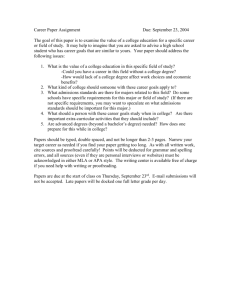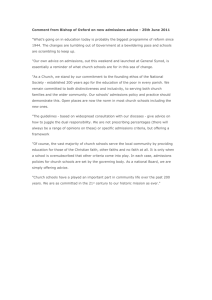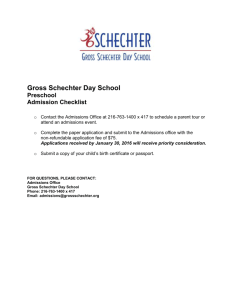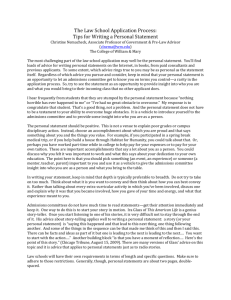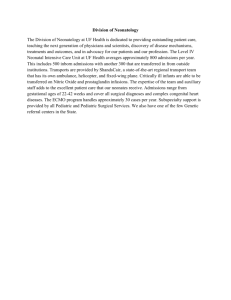Curriculum Information
advertisement
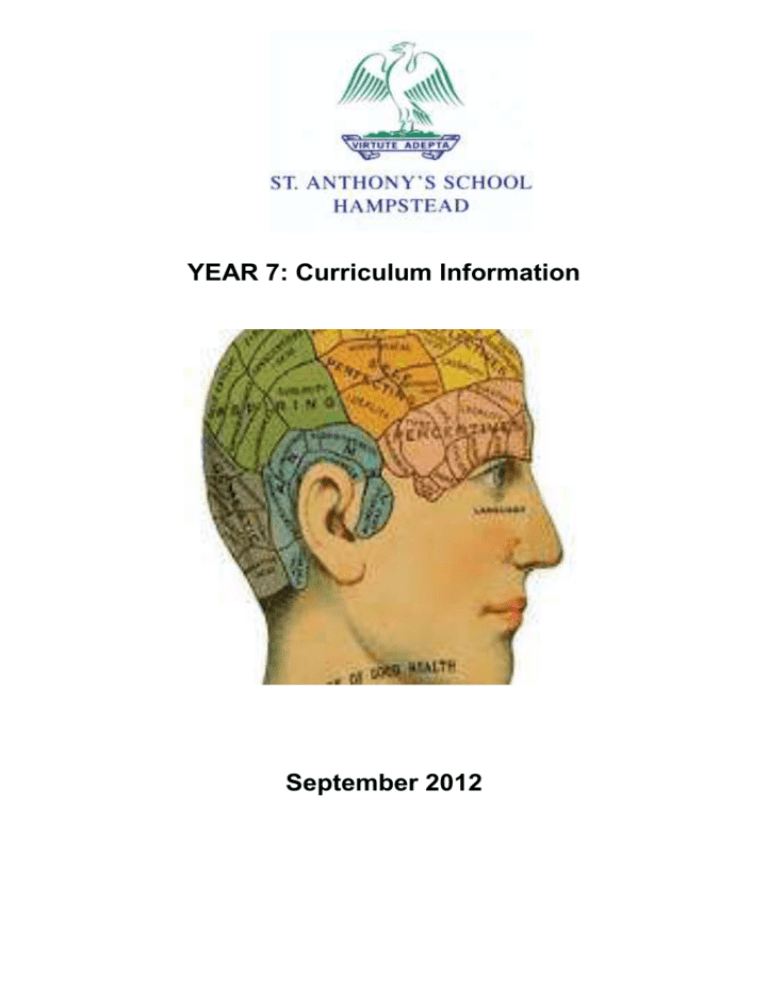
YEAR 7: Curriculum Information September 2012 This booklet complements those sent out last year and updates in the light of changes made by senior schools last year. Year 6 pupils were the first to face the new systems and acquitted themselves admirably. Year 7 will also prove to be one of the most important years academically for those preparing for school transfer at age thirteen. In addition to developing the knowledge, skills and understanding necessary for secondary school transfer, the boys revise, consolidate and build on their previous work. Admissions Websites of Most Frequently Discussed Target Schools If you click on these links, the latest information on admissions is available. Also, in many cases, you can access specimen testing materials. Some schools provide the facility to try tests on line. http://www.aldenham.com/senior/ http://www.bedales.org.uk/why-bedales.html http://www.brightoncollege.org.uk/admissions.asp http://www.cvms.co.uk/default.aspx?id=357 (Cardinal Vaughan) http://www.charterhouse.org.uk/admissions/admissionsin troduction.aspx 2 http://www.clsb.org.uk/admissions/ (City of London) http://www.downside.co.uk/School/admissions/admission s_process.html http://www.dulwich.org.uk/Document_1.aspx?id=1:29017 http://www.etoncollege.com/registration.aspx http://www.habsboys.org.uk/# http://www.harrowschool.org.uk/1563/admissions/ http://www.highgateschool.org.uk/admissions/generalinformation http://www.johnlyon.org/admissions.aspx http://www.kingalfred.org.uk/king-alfred-school/kingalfred-admissions/admissions-policy.html http://www.kcs.org.uk/node/254 http://www.londonoratory.org/tlos/htdocs/content.asp?cat=8 http://www.marlboroughcollege.org/col_admissions_poli cy.aspx http://www.mtsn.org.uk/admissions/ (Merchant Taylors) http://www.millhill.org.uk/admissions/ http://www.nbhseniorschool.co.uk/entry-procedure.html (Northbridge House) http://www.oundleschool.org.uk/admissions/index.php 3 http://www.portland-place.co.uk/Admissions/ http://www.oratory.co.uk/ (Reading) http://www.sevenoaksschool.org/admissions-landing http://www.st-albans.herts.sch.uk/sascms/admissions/ http://www.stbenedicts.org.uk/?page_id=10 (St. Benedict’s Ealing) http://www.stchris.co.uk/cms/index.php/home/admission s (St. Christopher’s Letchworth) http://www.stcolumbascollege.org/admissions.html (St. Columba’s) http://www.stedmundscollege.org/admissions (St. Edmund’s Ware) http://www.stpaulsschool.org.uk/admissions http://www.stonyhurst.ac.uk/page/?title=Admissions&pid =33 http://www.tonbridge-school.co.uk/admissions/ http://www.ucs.org.uk/admissions.html http://www.wellingtoncollege.org.uk/applying-towellington http://www.westminster.org.uk/admissions.html http://www.winchestercollege.org/admissions http://www.worthschool.org.uk/page.php?pid=101 4 Below, is a basic overview of some traditional St. Anthony’s target school entry procedures. It is not exhaustive: please do check the websites. All the key facts will be discussed at relevant parents’ evenings in the September term. Basic Overview of Some Key London School Entry Procedures St Albans Y7 In June of the year before On the basis Common Entrance, they of this provide a 12+ Preliminary assessment, Assessment. This is for they may http://www.stboys for whom St Albans is offer a place albans.herts.sch.u their first choice. The conditional k/sascms/admissi Assessment consists of upon ons/ exams in English, Maths and performance Verbal Reasoning, and Prep at Common Schools are asked provide a Entrance (as specimen folder of the a qualifying, candidate’s English work. not competitive exam); may suggest a further attempt at entry via the competitive Entrance Exam in February, or suggest that the candidate and his parents reconsider their choice of school in consultation with the Head of the Prep School. 5 Harrow Y7 http://www.harro wschool.org.uk/1 563/admissions/ Pre-Selection Test in Year 7 : In the Autumn term, at the beginning of Year 7, applicants will be invited to come to Harrow to sit the Pre-Selection Test. Boys are usually accompanied by either a member of staff from their school or their parents when they come for this test. The Pre-Selection Test consists of:· A computerised intelligence test A short composition (designed to assess spelling, grammar and vocabulary) An interview with a House Master An assessment of the head’s reference. Common Entrance pass mark is an average mark of at least 60%, including 55% in the core subjects of Mathematics and English. Boys who have done well in the Academic Scholarship, taken early in their year of entry, will not be required to sit the Common Entrance exams. UCS http://www.ucs.or g.uk/admissions.h tml Highgate Y7 Oct English Maths Reasoning Common Entrance Y8 After examination, some candidates interviewed. http://www.highga teschool.org.uk/ad missions/generalinformation 6 Mill Hill Y8 http://www.millhill. org.uk/admissions / Y8 Aldenham http://www.aldenh am.com/senior/ http://www.mtsn.o rg.uk/admissions/ The test is during the Spring Term and papers are set in English, Maths, Modern Foreign Language, Science and Verbal Reasoning. If Aldenham School is the only choice, an early offer may be made, subject to a satisfactory interview and school report. The test would be sat in the normal way. Y8 General Paper English Maths Biology, Chemistry Physics After examination, a number of candidates interviewed. Y8 School's own exam in all CE subjects (Latin optional). Scholarship candidates invited back for further interviews. http://www.habsb oys.org.uk/# Merchant Taylors Common Entrance All applicants interviewed with parents. Y8 Habs Maths, English, Science, French and Latin (Note that Latin is optional.) Common Entrance Y8 A religious studies examination and a French listening paper are sat at current school at the end of the Autumn Term 7 You may find the following websites useful: http://www.brightminds.co.uk/ - Ordering resources for the home; http://www.cgpbooks.co.uk/pages/home.asp - CGP revision guides; extremely child friendly, and good for revising the ‘basics’ for Maths and English; http://www.bbc.co.uk/schools/ks3bitesize/english/ interactive games; ideal for revising grammar and punctuation techniques. Setting arrangements It is important to point out that the pupils in all sets and groups are prepared for secondary school entrance exams and Common Entrance exams. Year 7 - the pupils are set for Maths and taught Science in that grouping. They are set for Latin and taught RE in that grouping. Year 7 sets are established by the subject Head of Department according to the previous year’s exam results (June) and formal assessment outcomes (November), supported by on-going teacher 8 assessments throughout the year, as well as feedback from the previous year’s teachers. Year 8 sets coincide with the high ability and mainstream teaching groups. The Year 8 teaching groups are established according to the exam results and assessment outcomes obtained during Year 7, supported by on-going teacher assessments. The pupils are taught all subjects in these groups apart from Maths and Science, which continue to be taught in the Maths set groupings. All setting arrangements will be reviewed formally twice a year, following the November assessments and June exams, in consultation with the Head of House. References to Senior Schools do not refer to internal sets. 9 Art and Design Technology in Year 7: Some examples.... Year 7 Artists, Engineers and Designers, will study a wide breadth of creative disciplines. Exciting and inspiring projects are supported by thorough technical and theoretical training. 10 Examples of previous projects include: designing and creating costumes for Drama department productions; studying colour theory and respond to the music inspired work of Kandinsky; learning about the proportions of the human head and using wire modelling to create a bust of their own; looking at the designs of the inventor Heath Robinson and working in a team to create a machine which uses all 6 types of mechanism, to pop a balloon; creating a multimedia painting of a still life inspired by the Golden age of Dutch painting. 11 Drama Throughout the year, the work is predominantly focused on Physical and Spatial Awareness. Autumn term Spectrum of communication: Physical only – Physical and Vocal – Vocal only The boys will explore what is meant by the terms ‘spatial awareness’ and ‘body language’. They will look at the many ways to express bold emotions/characteristics using only physicality. Moving along the ‘spectrum’, they will add speech to the physical communication. Concluding, at the other end of the line, they will create and record radio plays. Buster Keaton / Marcel Marceau on DVD or on YouTube The Saturday Play / The Archers BBC Radio 4 12 Easter Term Performance of original plays: Verbal and physical/physical only. Each boy will be in one of two original plays, written especially for St. Anthony’s Year 7, specifically created to develop further the physical and spatial awareness work undertaken in the Autumn term. One of the pieces will be a ‘play-without-words’ expressed through the use of movement only. The other play will have dialogue. Showstopper! The Improvised Musical’ –on YouTube ‘Whose Line is it Anyway US’ on YouTube ‘The Overcoat’ Trailer Dir: Morris Panych on YouTube Summer Term An introduction to improvisation: creation of character. An opportunity to explore improvisation and to begin to understand that ‘listening’, ‘accepting’ and ‘reacting’ are the most important elements to successful improvisation. 13 Year 7 English Throughout the year, a great deal of the teaching is centred on literature. The boys read a wide range of novels, which provide the basis for written work. The boys write in a wide range of formats, for example play scripts, radio scripts, internal monologues, diary entries and so on. Skills to be tested at the appropriate level include the following: basic understanding and vocabulary; summarising; capacity to distinguish between fact and opinion; use of text to illustrate answers; evaluation of formats; language used to persuade/instruct/present a case/warn/inform; drawing inferences; capacity to make comparisons and evaluate contrasts; delivery of opinions/judgements/arguments based on given material; capacity to write in both formal and informal English, showing a grasp of simple and 14 complex syntax and a range of appropriate vocabulary; awareness of the difference between slang and more formal English and the appropriateness of each in use; awareness of how grammar, syntax and punctuation affect meaning; knowledge of the basic terminology used in grammatical discussions, such as clause, phrase, the main parts of speech. Exam Preparation Entrance Exams Early in the first term, there are entrance exams to U.C.S. and Highgate. For the first section of the term, we will have a period of intense preparation. We will look at previous papers or papers of a similar standard. The aim is to familiarise pupils with the type of techniques required. Pupils will practise working within time limits. They will review exemplary answers. During the course of the year, pupils will be given the opportunity to give presentations to the rest of the class, using a computer and interactive whiteboard. Pupils select their own topics. 15 What we are trying to achieve We want the boys to engage actively and imaginatively with literature and to continue to develop their own individual voices as writers, producing authentic writing, based on their own experiences and ideas. 16 Brendan’s Recommended Poetry Anthologies The Rattlebag by Ted Hughes and Seamus Heaney (Faber and Faber) (Y7 & 8) The Dragon Book of Verse: edited by Michael Harrison and Christopher Stuart-Clark (OUP) (Y7 & 8) Poems 2: edited by Julia Markus and Paul Jordan (Longman) (Y7 & 8) The Oxford Treasury of Classic Poems: edited by Michael Harrison and Christopher StuartClark (OUP) (All Years) Poems from Other Centuries: edited by Adrian Tissier (Longman) The Puffin Book of Twentieth Century Children's Verse: edited by Brian Patten (Puffin) (will have some useful material for Years 5/6) Puffin Book of Classic Verse: edited by Raymond Wilson (Puffin) (All ages, with some poems for 5/6) A Puffin Book of Verse: edited by Eleanor Graham I Like this Poem - A collection of poems chosen by children for children: edited by Kaye Webb (Puffin) (All ages) The Poetry Book: edited by Fiona Walters Dolphin Books (All ages) Read Me A Poem a Day for the National Year of Reading: Chosen by Gaby Morgan (Macmillan Children's Books) (All ages Poems for over ten year olds: chosen by Kit Wright (Puffin.) (All ages) 17 Websites http://www.cool-reads.co.uk/ - a site containing book reviews written by 10-15 year olds http://www.bbc.co.uk/schools/gcsebitesize/english/ 18 French The Grammar covered in Year Six provides a solid base for the boys to begin Letter Writing work and more complex Comprehension work in Year Seven. The Oral component of French also becomes far more important as, at the end of the year, the boys will do a simplified version of the Common Entrance Oral exam. They need to focus on: Vocabulary The vocabulary from Tricolore Units 1-8. The Letter Writing phrases given out on sheets Grammar Regular Verbs; Irregular Verbs: Partir, Sortir, Pouvoir, Vouloir, Voir, Venir, Lire, Dire, Faire, Aller, Etre, Mettre; The Regular Perfect Tense; Irregular Past Participles in the Perfect Tense; The Perfect Tense with ‘Etre’; Simple Future with ‘Aller’; Further Reflexive Verbs; ‘Avoir mal a’/ ‘Avoir ‘ Expressions. Resources 19 Tricolore Total Book Two Useful websites: http://www.quia.com/shared/French; http://bbc.co.uk/languages/french; http://bbc.co.uk/schools/gcsebitesize/french; http://verb2verbe.com/francais/default.aspx; www.frenchlearningfun.net/Listening.html. 20 Geography The programme of study for Year 7 Geography is designed to bring the real world into the classroom as much as possible by investigating a range of topics and issues drawn from the following: tectonic processes, economic activities, rivers and atlas/mapping skills. We will also head to North Wales on a residential field trip to study rivers more closely and to collect data for the Common Entrance project. The aim is to develop the following key stage targets: a better understanding of geographical processes; a better sense of place; balanced viewpoints on a variety of current issues such as Fairtrade; skills of data presentation and analysis through the use of written prose, annotated diagrams, sketches, graphs, photographs and maps; improvement in their map reading skills, particularly their ability to use four and six figure grid references, and the identification of physical features on maps using contour lines; improvement in their global location knowledge; improvement in the presentation of their written assignments. 21 The boys are encouraged to investigate current issues relating to the topics by regularly reading the broadsheet newspapers and following the news on television and radio. Parents can actively encourage their children to follow current events. The boys are encouraged to bring relevant materials into school to form part of a display on a topic of study or to stimulate further class discussion. Video clips, images, animations and recent newspaper articles are frequently used to give the subject as much relevance to their lives as possible. The following are some websites your son may wish to look at to get a flavour of the year ahead: www.fairtrade.org.uk; www.bbc.co.uk/schools/riversandcoasts/rivers/what is_river/index.shtml; www.bbc.co.uk/Scotland/education/int/geog/envhas /flash/volvanoes/index.shtml. 22 History in Year 7 In Year 7, we begin the Common Entrance Course. We study the period known as the Making of the United Kingdom: 1485-1750. In Year 7 we begin by looking at the Wars of the Roses. We should finish somewhere around 1603. Much of the focus is on political history. However, we also study the social structures of Tudor England, looking at different classes and the lives that they led. We undertake an in depth study of Ket’s Rebellion and its causes, including enclosure of common land, population increase, rising rents and prices and other factors. Nobody can form any intelligent judgements about the period without an understanding of the religious issues. We look at the background to The Reformation and the religious changes in England from Henry VIII’s break with Rome to the formation of the Church of England under Elizabeth. We also look at the opposition to this church from both Catholics and Puritans. The pupils also study the plight of Catholicism in England after 1603. Materials Each pupil is given a copy of the text-book So You Really Want to Learn History Book Two, Britain 1485-1750. In addition, each pupil is given a bound 23 booklet, containing teacher’s notes for the whole year. We use a great deal of visual material, including reproductions of portraits and contemporary drawings and paintings. The pupils are helped by the use of films. Some are documentary, whilst others contain enacted recreations of historical events. What we are trying to achieve Obviously, we want the boys to engage with the past. We want them to learn to think using appropriate historical concepts and to learn that the past cannot always be judged by today’s standards. Boys are encouraged to form opinions and make judgements, supported by facts. They are taught to find evidence in a wealth of sources and to appreciate the fact that we learn history from much more than books, for example, buildings, paintings, plays, poems and so much more. Websites http://www.nationalarchives.gov.uk/about/ http://www.bbc.co.uk/history/ 24 Latin The second year of Latin seeks to consolidate and develop what had been introduced in Year 6: 1st and 2nd declension nouns and the present, imperfect and perfect tenses of verbs in all conjugations, using some 200 words. The year 7 course book, Latin Prep 2, covers the syllabus for CE level 2. It starts with the 3 rd declension nouns and adjectives, all genders, and the future tense of the first and 2nd conjugations, moving on to the comparison of adjectives of 1st and 2nd declensions, the demonstrative adjectives hic and ille, and the future tense of 3rd and 4th conjugations. The introduction of antequam and postquam neatly introduces the pluperfect tense in Chapter 5 and possum in all tenses. Chapter 6 picks up the comparative and superlative of adjectives by introducing bonus and malus; it also introduces the third demonstrative is. Chapter 7 presents the comparison of 3rd declension adjectives, followed by the formation and comparison of adverbs. Chapter 8 reviews the imperative and introduces prohibitions. The remaining topic of eo and its compounds is presented in Chapter 9. The vocabulary for level 2 is a further 200 words. 25 In addition, the adventures of Odysseus will be introduced on DVD for the background CE question. http://en.wikipedia.org/wiki/Odysseus - general information about Odysseus. http://livebinders.com/play/play_or_edit/80381 - a site, partly aimed at primary level children, but contains useful information about ancient Greece and further links (to SchoolHistory.co.uk, for example) on mythology and other materials. http://livebinders.com/play/play_or_edit?id=21779 – as above but entitled, ‘The Romans: what did they do for us?’ and focussing on Ancient Rome. Click on ‘The Roman World’ to find information about Julius Caesar and other emperors. 26 Mathematics Over the year, we should cover the following topics: Number Decimal multiplication and division; Percentages – increase/decrease percent and percentage change; Estimation and being able to round answers off to significant figures or decimal places. Algebra Look at harder questions on simplifying, substitution and solving; Factorisation; Forming equations from information given Inequalities (not examined in year 7). Shape & Space Properties of quadrilaterals; Angles associated with polygons; Bearings – being able to construct a scale diagram. Volume of prisms; Circumference & Area of circles; 27 Constructions – being able to bisect a line, an angle and drop a perpendicular; Drawing Linear and Curved graphs from an equation; Pythagoras’ Theorem (not examined in year 7); Speed. Handling Data Probability – finding and using possibility tables; Transformations – being able to reflect; rotate, translate or enlarge an object. Using mean, mode, median and range to comment on a set of data. Some interesting websites to support your son’s learning through the summer and the next year are: http://www.brainpop.com/ ;- click on ‘Math’; http://www.bbc.co.uk/skillswise/; http://www.coolmath.com/. Maths enrichment classes will be offered throughout the year at various different points of the week. 28 Music Karl Leutfeld has now been with us for one year. Joe Burgess will continue as a full time member of staff next year. This has enabled us to redesign the music provision inside and outside the classroom. A new syllabus will be tabled in September 2012. http://www.stanthonysprep.org.uk/Curriculum/Music 29 Religious Education In Year 7, students will begin to prepare for their Common Entrance papers, becoming familiar with the style of questions they will face at the end of Year 8. There are three key skills they will develop: recall of key details from Biblical passages; explanation of what these passages reveal to Christians about God and the nature of human life; discussion of a religious position – explaining why someone might take up a position on a question of ethics and religion, and why others might disagree. There will also be some lesson time set aside to study other world religions and topical ethical and religious questions. Term 1 Creation and the Fall Students will develop a detailed understanding of the first three chapters of Genesis. They will consider what the beginning of the Bible is meant to teach us, taking opposing views into account. The Bible will be compared to scientific accounts of the beginnings of the universe and life, and students 30 will give a reasoned answer to the question, “Are science and Genesis in conflict?” Abraham Students will understand how Abraham was called by God, and what the covenant between them involved. They will consider what the covenant between man and God involves. They will discuss the significance and problematic nature of the story of Abraham’s near sacrifice of Isaac. Term 2: Moses Students will learn about the call of Moses and the events that led up to the Passover. They will explore how the Passover is significant to Christians and Jews. Then students will investigate the Ten Commandments and the covenant between God and His people. The life and death of Jesus Students will commit key events to memory and develop their opinions about the significance of the events. Students will learn about the purpose of Jesus’ parables and miracles and will be able to discuss examples of each. 31 Term 3: Discipleship Students will learn about the first disciples and compare their experience and mission with that of disciples today. Passion and Resurrection Students will study the account of Mark in detail, with reference also being made to chapter 20 of John’s Gospel. Useful websites: http://video.iactiv8.com/ A wide range of videos and podcasts produced by Catholics for young people. http://www.bbc.co.uk/religion/religions/christianity/ http://www.tere.org/index.php?id=104 This Roman Catholic websites contains, amongst much other useful material, some revision games. http://www.nationalgallery.org.uk/visiting/floorplans/le vel-2/room-66 The National Gallery is well worth visiting, and the website also includes some interesting information about important religious works of art. http://www.vatican.va/archive/ENG0015/_INDEX.HTM The Catechism of the Catholic Church, included on the Vatican website. 32 Science The Year 7 Science continues the Common Entrance syllabus started in Year 6. The curriculum is designed to be a spiral, where many topics are revisited and extended upon. Practical work is again a key feature of Year 7 and the boys are required to follow more complex instructions and make careful, detailed records of their observations. Analytical skills are also vitally important and independent thinking is crucial in Science. Topics covered in Year 7: Biology Cells and photosynthesis; Food and digestion; Environment and adaptation; Human movement and reproduction; Respiration. Chemistry Patterns of chemical behaviour; Elements, compounds and mixtures. 33 Physics Light and sound; Electricity and magnetism. The boys will be given the text book ‘So you really want to learn about Science’, which will enable them to follow the content of the lesson and undertake their own background reading at home. This is expected and should be encouraged when the boys complete their homework. The boys are assessed every term in Science, and from January, the boys will sit three short (40 minute) papers: one each in Biology, Chemistry and Physics. Suggestions for studying: When revising for exams and assessments, study small amounts at a time, rather than trying to cover all of Biology in one sitting. You will need to be familiar with a lot of “science vocabulary” so use methods such as underlining/highlighting in notes, flashcards etc., to help you remember the terms and definitions. There are common skills, which are assessed often, so make sure you are familiar with (among others): Graph drawing (eg; title, labelled axes with units etc); 34 reading information from a graph; finding information in a table; making a prediction; designing an experiment; suggesting why experimental results vary. It should go without saying, but, ‘Do not leave revision until the last minute and do your work in a quiet area, not in front of the television!’ Below, are some suggested websites that the boys may also like to look at to support their understanding in Science: http://freezeray.com/ - this can be quite advanced in terms of the content, but there are some interesting experiments; http://www.bbc.co.uk/schools/ks3bitesize/; http://www.ted.com/ - then click on ‘Technology’ to watch and listen to some interesting talks. http://www.brainpop.com/ - click on ‘Science’. 35

